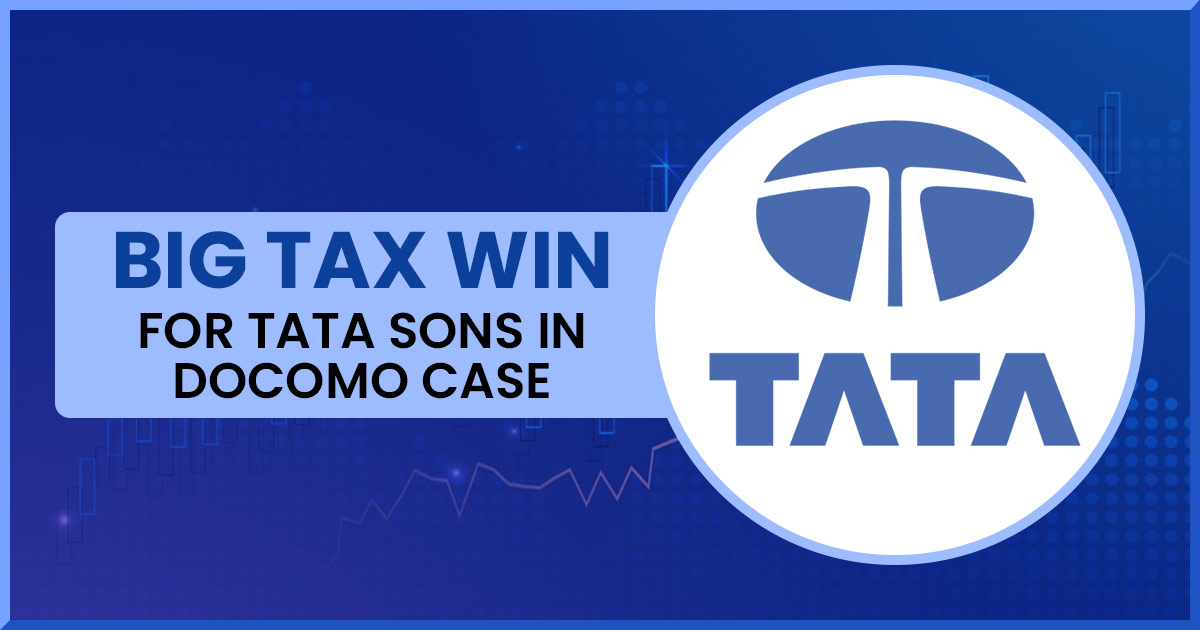
The GST department’s Adjudicating Authority (AA) in relief for Tata Sons has dismissed a GST demand of over Rs 1500 crore to the company for a settlement deal with Docomo.
The order of AA will act as a precedent for the companies involved in arbitration. There is an option of contesting for the department before the HC. In 2019, the Directorate General of GST Intelligence (DGGI) asserted 18% GST on the $1.27 billion the Tata Group holding company paid to the Japanese telecommunications company in 2017 to settle a dispute with Tata Teleservices.
It was claimed that as the payment was incurred on Tata Teleservice’s behalf, therefore the same must be considered as a loan from Tata Sons to the group firm and thus is levied 18% GST. Tata Sons contested the claim, stating that the payment was the consequence of arbitration proceedings in a London court and hence no GST was charged.
Thereafter, in November 2022, a writ petition was filed by the salt-to-software conglomerate before the Bombay High Court where it cited a circular issued by the Central Board of Indirect Taxes and Customs (CBIC) on August 3, 2022, and another issued dated February 28, 2023, for asserting that no GST can be imposed on liquidated damages.
The amount was the due paid on behalf of Tata Teleservices by Tata Sons and not for any services rendered through Docomo. It is an arbitration case that was paid and closed. In a very technical manner DGGI is examining it, the company had appealed before the High Court.
But in 2023, the High Court authorized the department to issue a Show Case Notice (SCN) before the company which was contested via the company to the AA. The AA has laid on the claims that the company has made while giving the judgment in its favour. As it is the order of the AA, it shall act as a precedent for the other companies who are facing identical litigations, as per the person.
No comment has been furnished by the Tata Sons on the order of AA. The DGGI imposed the GST under Schedule 2 of the CGST Act, which regards the loan payment as a service rendered. Tata Sons is the holding company of Tata Teleservices and hence an 18% GST is obligated to be paid by them. Counsel specializing in indirect tax and arbitration, Advait M Sethna, cited the Telangana Advance Ruling Authority in a ruling and carried that GST is not payable on out-of-court settlements.
As per them, the liquidated damages emerging in arbitration are waived from GST. But it emerges that if the award is furnished to claims coming out of goods and services specified under the GST act, then no GST would get imposed to that extent. Money security and actionable claims would get waived from the description of the GST act, Sethna cited.
NTT Docomo acquired a 26.5% stake in Tata Teleservices in 2009. The two sides agreed that the Japanese company could leave the venture at a pre-determined minimum price of at least half of what is invested in the stake. The Japanese firm seeks to practice that option in 2015 because of the financial issues of Tata Teleservices.
Read Also: Authority Must Review the Correctness of GST Returns Before Action U/S 73: Madras HC Quashes Order
The opinion of the Reserve Bank of India (RBI), was that the exit can only arrive at a fair market value, in tune with a revised rule in 2013. Tata Sons thereafter led by the Late Cyrus Mistry, quoted this and refused to pay the agreed amount. Docomo furnished for international arbitration and in 2017 it mentioned that it was assigned $1.27 billion from Tata Sons through an international arbitration court for its stake in Tata Teleservices Ltd (TTSL).









